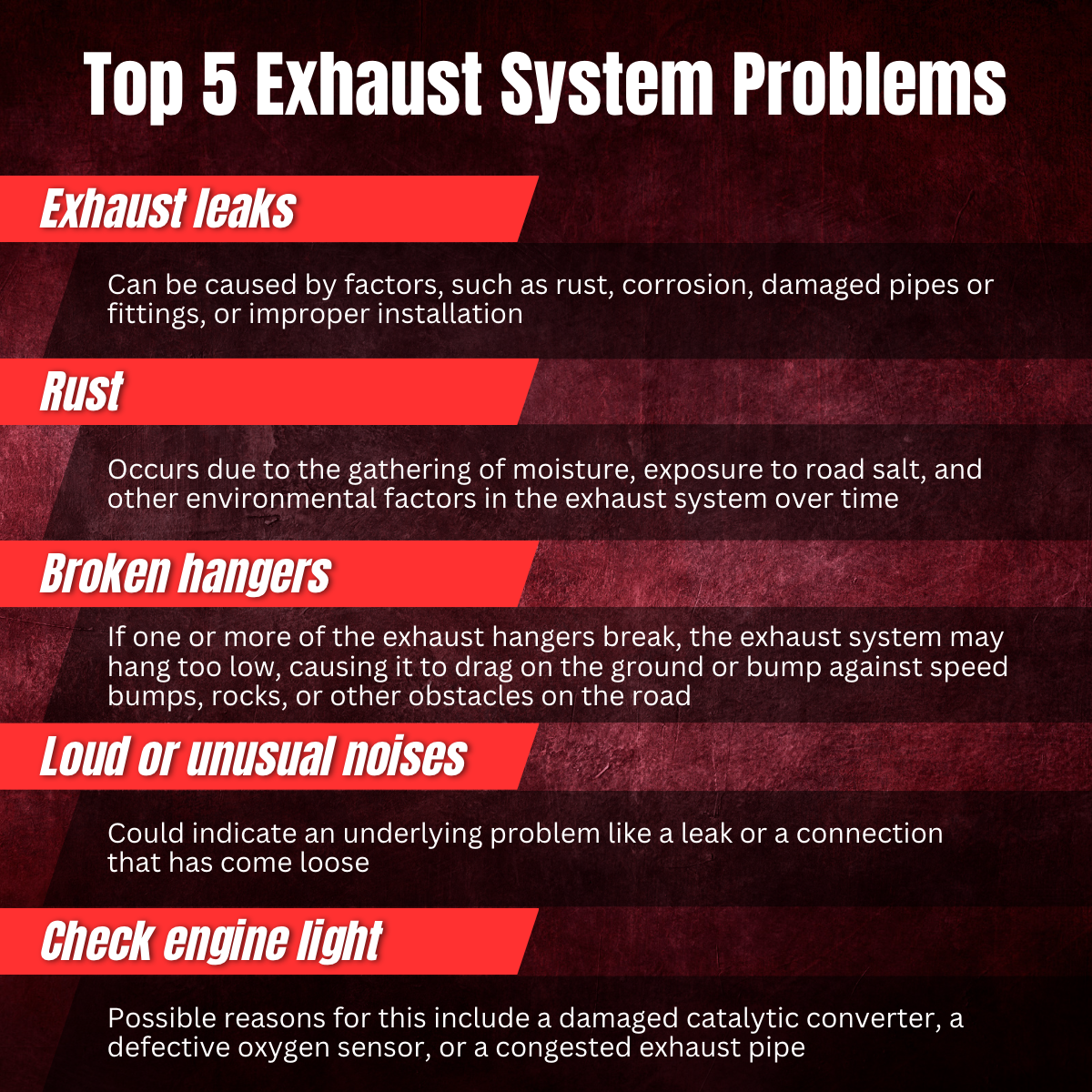- Exhaust
- Suspension
- Performance
- Towing
- Filters
- Truck
Top 5 Common Exhaust System Problems and Their Quick Solutions
Date Posted: 12 April 2023

Your car's exhaust system is crucial for the safe removal of exhaust gases and maintaining its proper functioning. And like any other automotive component, exhaust systems can experience problems over time. Here are some of the most common issues car owners face with their exhaust systems and solutions on how to address them.
1. Exhaust Leaks
Exhaust system leaks are a frequent problem, which can be caused by a wide range of factors such as rust, corrosion, damaged pipes or fittings, or improper installation. These leaks can result in poor engine performance, increased emissions, and potentially hazardous fumes. Leaks in the exhaust system can be difficult to detect because they often occur in hard-to-reach areas, and the symptoms may not be obvious.
Solution:
It is crucial to have a competent mechanic inspect it. Initially, they must identify the leak and its root cause. Depending on the severity of the issue, they may have to replace a damaged pipe or fitting or fix the leak with a patch or sealant.
2. Rust
Rust is a prevalent issue that arises in exhaust systems, mainly in older vehicles. Rust development occurs due to the gathering of moisture, exposure to road salt, and other environmental factors in the exhaust system over time. This corrosion can create holes, cracks, and leaks in the exhaust pipes, causing poor engine performance, decreased fuel efficiency, and the possibility of dangerous fumes entering the passenger compartment.
Solution:
There are two ways to handle rust in the exhaust system:
- One way is to replace any rusty components with new ones, and in some cases, replacement of the entire exhaust system. Chances of rust and corrosion can also be reduced by keeping the vehicle clean and avoiding driving on heavily salted roads or through deep puddles.
- Another approach is to apply a rust-resistant coating. Coating the exhaust system with rust-resistant material can be a cost-effective option, particularly if the rust is minor and the system is in good working order. This can help to prevent rust from spreading and prolong the lifespan of the exhaust system.
3. Broken Hangers
The exhaust system of a vehicle is reliant on exhaust hangers to maintain its stability and security. These hangers are responsible for anchoring the exhaust system and avoiding excessive movement that may lead to harm or disturbance with other parts of the vehicle.
If one or more of the exhaust hangers break, the exhaust system may hang too low, causing it to drag on the ground or bump against speed bumps, rocks, or other obstacles on the road. This can cause further damage as well as other parts of the vehicle, and may even create a safety hazard if the exhaust system falls off completely while driving.
Solution:
The most effective resolution to this is to have the defective hangers replaced promptly. A skilled mechanic can examine the exhaust system to detect any damaged or deteriorated hangers. They can then swap out the impaired hangers with fresh ones, ensuring that the exhaust system is securely fastened and performing correctly. By doing so early on, vehicle owners can circumvent costly repairs or potential safety hazards in the future.
4. Loud or Unusual Noises
If you notice your car's exhaust system is making loud or strange noises, it could indicate an underlying problem like a leak or a connection that has come loose. This issue should be attended to promptly as it can result in additional damage and unsafe driving situations.
Solution:
Consult a trained mechanic who can meticulously inspect the exhaust system and determine the underlying cause of the noise. The mechanic may use specialized equipment to detect any leaks or fractures in the system, or may visually examine the pipes and connections to look for any loose or impaired components.
After the problem has been identified, the mechanic can then proceed to start on the required repairs to address the issue. This could involve the replacement of any damaged parts or the repair of any leaks to reinstate the appropriate functioning of the exhaust system.
5. Check Engine Light
The check engine light plays a vital role in detecting any performance problems with the car. A potential cause of the check engine light turning on could be associated with the exhaust system. Some possible reasons for this include a damaged catalytic converter, a defective oxygen sensor, or a congested exhaust pipe.
Solution:
It is advisable to take your vehicle to an authorized mechanic for an inspection. They can use specialized diagnostic tools to determine the underlying cause of the issue and then carry out the required repairs. This may include visually examining the exhaust system, using an OBD (On-Board Diagnostics) scanner to retrieve error codes, or performing a smoke test to detect any leaks in the system.
Once the root cause of the check engine light is determined, the mechanic can proceed with the required repairs to fix the problem. This could include repairing any damage to the exhaust system or replacing faulty parts. Also, the mechanic may clear the error codes and perform a test drive to ensure that the issue has been resolved completely.
To ensure the proper functioning of your vehicle and prevent any hazardous occurrences, it is crucial to know of these typical problems that may arise in the exhaust system. Familiarizing yourself with the indications and remedies for such issues can save you from incurring significant expenses and worsening the problem. Regularly checking and maintaining your exhaust system is essential, and you should seek the help of a professional mechanic if needed.
Leave a comment











